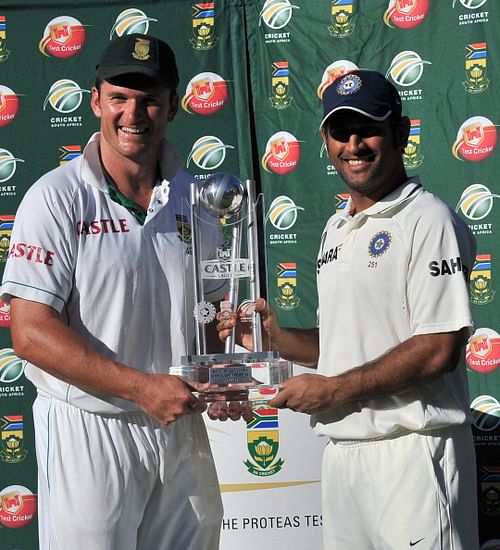
Prudence vs. Allure: Steering the captaincy riddle

Graeme Smith (L) and Indian captain Mahendra Singh Dhoni
The role of a captain in a cricket team is one that’s very tricky to execute. It’s a vast job portfolio that requires perfection in each decision and yet is one that never gains the captain any favours. One can never consistently be the people’s favourite as a captain because, often within a blink, hits turn into misses and hard-won respect gets torn into tatters.
The prospect of such a tricky yoke bending them to the ground, however, doesn’t stop many cricketers from dreaming or coveting about becoming a leader. When the victories that follow bring along with them the praises, the attraction and allure behind all those years of dreaming leaves a sense of vindication. To the captain, it is a cloak of invincibility that he proudly wears his heart on his chest.
In moments like these, it isn’t hard to imagine why the responsibility appeals to the ones it does. Overwhelming adulations are feedback enough for those cricketers who are trusted with the skippering responsibility without asking for it in the first place. Their confidence gets boosted as their scepticism fades away about whether they can justify their team, and themselves, after taking over the job role.
Where there are praises, it doesn’t take long for brickbats to follow. In victories, a captain’s strategy is not just appreciated, but it is analysed, from all corners, to its barest bones. The team is declared the winner, but analysts and pundits waste no time in anointing the captain as the chief strategy-maker, contributing to the team’s win.
In losses, however, any strategic decision – be it the same one which netted them victories – becomes the sore point to raise contentions against the captain. At such times, quite conveniently, the world forgets that the captain is only as good as the team he has and that any decision of his reflects the best interests of the team at heart.
It didn’t take long for MS Dhoni‘s bright skippering fortunes to dwindle into uncertainty after the dismal Indian performances in South Africa and New Zealand; they ended up drawing crucial Test matches on both those tours after being in a position to win them.
It’s not about the Indian skipper alone. Alastair Cook, after the debacle of the Australian Ashes leg, and Michael Clarke, after two disastrous series in India and England, are two of the other prominent captains who have been recently under fire. While Clarke was able to turn things around for himself to have his job secured, Cook hasn’t. The England captain’s job looks safe, though, as the team management still seems to favour him.
And if it isn’t for losses, there are controversies erupting out of attitudinal issues, where the captain suddenly finds each of his action heavily scrutinised and ready to be labelled under newer orders of misconduct. If he’s too polite, he’s tagged as a sycophant. If he’s too blunt, he’s pronounced as an unmannered aggressor.
To be a captain thus means that one has to be prepared for facing such eventualities and outpourings. The trigger may be anything or be nothing at all, but, for the man at the helm, it’s important to understand that all good things could, and do, come to an end.
The problem, however, is that where captains may to a certain extent have an idea about how times could change for them, even when under the charming spell of the role, rarely does it happen that a captain voluntarily gives up the job when the going is easy for him.
When someone does relinquish it, as Graeme Smith did a few weeks ago, the surprises stun everyone to silence. Not because of any questionability over the decision-making, but because of admiration for the person deciding to take the most pivotal step back.
For it’s not so easy to give up. Like the distinct mix of audaciousness and hope that cricketers have about remodelling the face of the team once they have taken over the captaincy mantle, it requires equal parts of courage and self-belief to be prudent and call it quits before the turncoat world can pinpoint their fingers at them in scorn and vexation.
In the interest of the sport, it is then better to be a captain, and a player, who choses to re-evaluate his priorities rather than be one who has to be forced to reconsider his options by circumstances, the circumstantially-altered system and the individuals manning it.